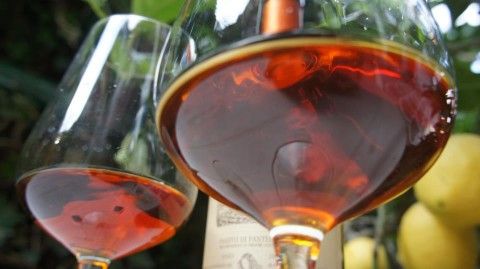 |
| The intense colour of Ben Rye |
Charming wines, meditation or sipping wines, but not only this. Passito wines are increasingly gaining popularity even among non-experts. The reason is clear. The notes of their mellow flavour with the intrigue of their olfactory characteristics make them more and more popular especially among women. But what are the features of these wines? What makes them special?
Passito wines generally can not be defined as special wines, as it should not be added any substance or alcoholic spirit in the process leading to their formation. However we often have fortified dessert wines. Passito wines don't always coincide with sweet wines: Amarone della Valpolicella and Sfursat Valtellina are big exceptions to this assertion, since they are still dry wines, while passing through the same process of winemaking.
Passito wines generally can not be defined as special wines, as it should not be added any substance or alcoholic spirit in the process leading to their formation. However we often have fortified dessert wines. Passito wines don't always coincide with sweet wines: Amarone della Valpolicella and Sfursat Valtellina are big exceptions to this assertion, since they are still dry wines, while passing through the same process of winemaking.
Sweet wines are obtained by drying the grapes before fermentation in two ways: natural and forced. Passito wines belong to this second classification.
Naturally dried wines undergo an over-maturation directly on the plant, thus enriching the sugar component and concentration of the grape itself: this procedure is used for example for the Aleatico, produced in
The so called MUFFATO wines undergo the same process (above all the Muffato della Sala Antinori) being in addition attacked by "noble rot", or Botrytris Cinerea, which dehydrates the grape and brings to a considerable enrichment of its aroma. Bordeaux Sauternes, the Hungarians Tokaji Aszu and German TBAs undergo the same process, to quote only the prominent ones.
| Antinori's Muffato della Sala |
The ice wines from Germany, Austria and Canada are called so because the harvest is done very late, almost in winter, often at night and with a halo of ice surrounding the berries, which subsequently will contain a reduced amount of water, and a concentrated rate of sugars.
Many dessert wines instead come from a forced drying, after the harvest, putting the grapes under the sun or on small mats of wood and hemp, sometimes ventilated and kept at a certain temperature indoors.
Greco di Bianco, sweet Calabrian wine, is processed in the former way, as well as the Passito of Pantelleria, with its grapes drying on racks under the burning sun of
In accordance with the latter method, the grapes are dried on mats for some time (for Vin Santo until the Holy Week) and then they are pressed and aged, with a process of maturation of the wine that can range from two to eight years. This way you will have Recioto di Soave, Malvasia delle Lipari Passito, Caluso Passito, Vin Santo Toscano and from Trentino, Friuli Ramandolo and other stirring wines.
 |
| Vineyards of Zibib in Pantelleria |
Passito di Pantelleria: Wine of the Wind and the Sun is produced in our "African" island, situated 83 kms from the coast of
Donnafugata Muscat Passito Ben Rye (i.e. Son of the Wind in Arabic, like the athlete Carl Lewis!), produced in a "subsidiary" of the famous winery owned by the Rallo brothers having its headquarter in Marsala, is constantly considered by specialised press as the best Italian passito. It has a yellow amber and topaz colour, varied and intense nose, recalling candied notes of peach jam, apricot, orange and figs, as well as fine caramel that melts in the mouth with great delicacy and smoothness. It absolutely doesn't disappoint the palate after the explosion of a wide range of perfumes already shown in the nose. Sipping wine, it is usually coupled with biscuits (or dried pastries), but gives its best accompanying the local "ricotta" or blue cheeses such as Gorgonzola, Stilton or Rochefort. Preferably it is served in tulip-shaped glass of average size at 14 °.
Other important passito producers are Salvatore Murana, with two amazing wines, called Khamma and Burdingana, nearly at the same level of Donnafugata; Miceli, with Nun and Entelechia above all and Marco De Bartoli with his mellow and tasty Bukkuram. Last but not least, we have to mention another famous actor who took up the wine art: we are talking about Gerard Depardieu, who bought, along with his companion, Carole Bouquet, 8 hectares of land in the island and resumed the activity of a disused farm, by producing oil and a gentle and delicious Passito called Sangue d’Oro (golden blood). It is not the first experience as a vigneron for Depardieu. He owns since the 80s as well 35 hectares in the Anjou la Loire ) producing above all good rosés from an extraordinary grape, Cabernet Franc. He was told able to recognize and distinguish the smell and flavour of a Cabernet Franc from Anjou , from one from Touraine
| Depardieu and Bouquet's Sangue d'Oro |
 |
| Le vigneron Gérard Depardieu in Pantelleria |
Give Passito a shot then and you surely won’t regret!!!